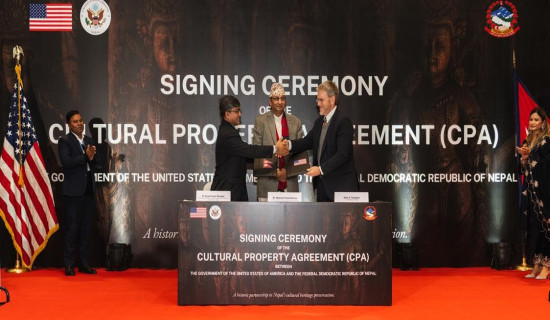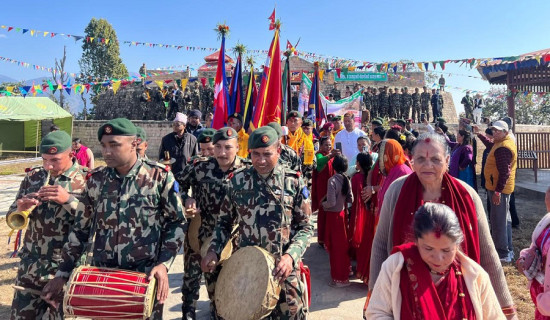- Thursday, 8 January 2026
Discourse On Sex In Nepal
Dr. Tulasi Acharya
The more we head towards the civilised world, the more we hear news about rape cases, sexual abuse and harassment. Nepal’s Facts Research and Analytics, the study of the Human Rights Commission and other miscellaneous police reports also show that incidents of rape are increasing. Looking at data from the United Nations, rape cases are growing globally. Especially in a patriarchal country like Nepal, the cases are even higher. Why is such horror rampant and hidden within the so-called civilised society even today?
Two Incidents
Here are two incidents to begin with in this article. First, while working for an organisation that worked for people with disabilities, a thirty-five-year-old man with a disability told as if he was going to rape someone right away, “I want to have sex with a woman.” The statement was a challenge to those who thought a person with a disability would have no sexual desire, but what was shocking was not what he said, but how he said it—his statement carried a sort of deep-down anger much more than the love. One could contemplate his sexual desire—perhaps it was because he has never had sex in his life, and, as a result, that turned into a sort of latent anger and depression.
Second, a tourist— who one night in Nepal encountered a sex worker who took his money and ran away, and he again reached out to another one the very next day and managed to have sex with her— said with a fully satisfied look, “This time I even enjoyed having sex venting all my anger and frustration I got from the one who took my money and ran away last night.” Listening to him, one could be dumbfounded: what sort of sex it was—so dull and depressed, filled with anger and revenge that didn’t carry love and feelings at all. Isn't the highest point of the sexual act the deepest love in the making, the meeting of two souls, and the physical, mental, and psychological satisfaction that different books on sex, such as the Kamasutra talks about?
Rape, gang rape, child rape, kidnap and rape, teacher raping student, father or grandfather raping daughter or granddaughter and similar scandals have been heard very frequently in news. One of those scandals in the context of Nepal, for example, is the Nirmala rape scandal and the recent Sushmita Scandal.
When such news stories are out, they make anyone’s hair stand on its end and make them act immediately either by hanging the rapist or cutting his penis. But will such punishment be given to the rapists to prevent the rape from happening? Before this question is answered, the discourse on sex in Nepal needs to be discussed.
Rapes Increasing
If one looks at the increasing rape incidents in Nepal, it can be since sex is viewed as a filthy topic to talk about— especially since the patriarchal society has a mindset that perceives sex as a very uncivilised and dirty topic to bring up. Thus, sex becomes merely a tool to dominate, deride, loathe, disrespect, and humiliate the person, especially women. Nepali society is very pretentious in this matter—the society that has been watching and reading miscellaneous sexual positions and postures of gods and goddesses that have been chiselled out on the wooden Hindu temples in Kathmandu and discussed in the Kamasutra as pious and religious finds the discussion of sex or the act of kissing between the partners in public deviant, uncivilized, and perverted.
Such a pretentious society considers Madan Rai, an agriculturalist and social scientist, a pervert when he talks about sex openly on social media. They deride Rai, saying, "Perverted Rai is going to ruin Nepali society and the prestige of Rai community." Society doesn't want to bother with the interpretation of healthy sex and its relationship with human quality of life, but rather does keep it as a topic of shame to discuss.
Whether that be an incident of Draupadi— a single wife of five Pandava brothers in the Mahabharat story— who was made naked in public in front of her husband, or be the incident during the Rana era when the husband was tortured by making his wife and forcing her to walk along the city naked. What this shows, especially in the South Asian context, is that a woman’s sex is more of a thing attached to a family's prestige or dignity rather than it should have been the act of optimum point of love or an indispensable biological need that has an important relationship with a quality life.
Such discourse on sex in the Nepali context has created a rhetoric of sex and sexual activity in such a way that one understands sex as a means just to procreate children only, otherwise that must be kept secret and hidden. Nepali society unconsciously has defined and used sex as a tool of punishment or as a means of taking revenge, venting anger and frustration, and stripping the woman and her family of her prestige. Such a deep-rooted discourse of sex in Nepali society has prevented many of them from making and understanding the connections between sex and sexual activities to the significance of human quality of life.
Rhetoric Of Sex
In a patriarchal society like Nepal, such rhetoric below builds elusive psychology on men that abet them to rape.
1. “When a woman says ‘no,’ ‘no’, that means she is saying ‘yes,’ ‘yes’”: At times boys in their early twenties are heard talking about their girls. One says, “I tried so hard, but she kept saying ‘no,’ ‘no’. And his friend next to him says, “she is pretending, you know. She wants you. You must try harder.”
Such rhetoric is the outcome of a patriarchal society that has already shaped the understanding of men over females' bodies, resulting in rapes. C. Muehlenhard, L. C. Hollabaugh’s research article “Do women sometimes say no when they mean yes? The prevalence and correlates of women's token resistance to sex” shows that when women say “no” that means “no.” It is because they have been looking for the guarantee of intimacy and love, not because they didn’t have sexual desire. When a man ends up having sex without the woman’s acceptance, that becomes rape, which leaves a long-term trauma upon the woman.
2. “I am a man, dude”: This is another rhetoric the patriarchal society has created. The impression it has left is that being a man is not to be a woman, but rather to demonstrate "manliness," which means a man can marry as many women as possible. Even society stamps on the certificate of his manliness if he has more than one wife. Society defines man in terms of his anger, pride, revenge, and revolt, while women are defined in terms of the word like passive and tolerance like earth. Such discourse and rhetoric encourage rape in society.
3. “What a beauty she is—look at her slim body, big chest, beautiful butt, and pretty face. This type of language defines the beauty of a woman that lies more in her appearance than her inner talents. Such beauty is advertised everywhere from the world of glamour to literature, film, and advertisement to beauty pageants. Such projections of women prevent sex and sexual activities from understanding from the perspective of love, feelings, sympathy, and sensitivity. Gender-biased pop culture and stereotypes have marginalised women, resulting in many rape cases.
Again, most rape incidents are the outcomes of such discourses that look at sex as a topic of taboo, as a matter of the person’s and the person’s family’s prestige. Especially in the context of Nepal, when sex is attached to the woman's dignity, two things come into play: I) sex is attached to the woman’s dignity and that encourages men to rape her without her acceptance if he wants to kill her dignity. II) since the woman’s dignity is connected to her family’s prestige, the family doesn’t want to bring the case up even if it becomes aware of the rape and it, therefore, encourages the rapist even more.
Understanding of Sex
In conclusion, the unhealthy understanding of sex in the context of Nepal has encouraged rape. When sex is understood only in terms of the relationship between penis and vagina, it abets rape. When society fails to mete out equal power to all sexes and acknowledge the importance of their equal participation, it encourages rape.
As patriarchal society continues to think that venting anger and frustration against women, killing her moral dignity and family prestige, and taking revenge and ridiculing her is the only way through having non-consensual sex, it inspires multiple incidents of rape.
When one fails to understand the meaning of sex and its relationship with human quality of life, when one fails to acknowledge the significance and indispensability of sex in one's life, when one cannot incorporate the biological need for sex in living beings and when one cannot treat sex as the optimum point of love and intimacy, sympathy, humanity, and as the meeting of two souls, rapes continue to take place.
Madan Rai writes a status on his Facebook wall: "Let's remove the idea of female dignity imposed onto her vagina. Vagina must be transparent; it is not a hidden topic." Until a healthy understanding of sex replaces the current cultural discourse and rhetoric of sex in Nepal, no punishment will stop the rape incidents.
In the name of civilisation, it is a curse that society has failed to understand sex as the most important part of healthy and quality life and has rather perceived sex and sexual activities as uncivilised and filthy demeanour. Robert McRuer and Anna Mollow in their book "sex and disability" write that sex is the most important part of quality life. Let's respect it, without making it a topic of shame and stop the rape incidents to occur frequently.
(Acharya holds a Ph.D. in Public Administration)

















